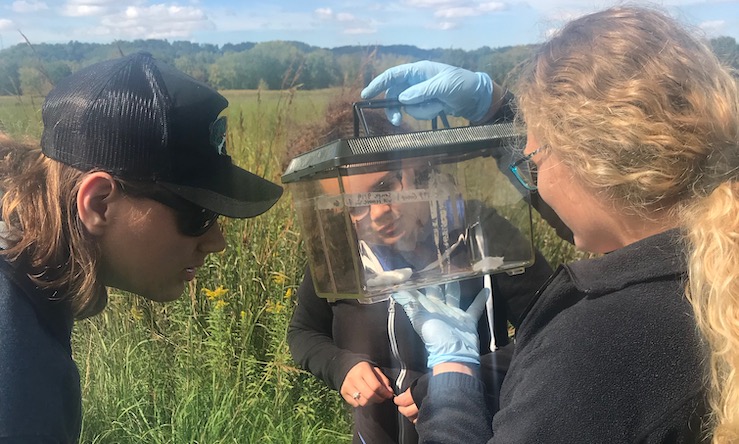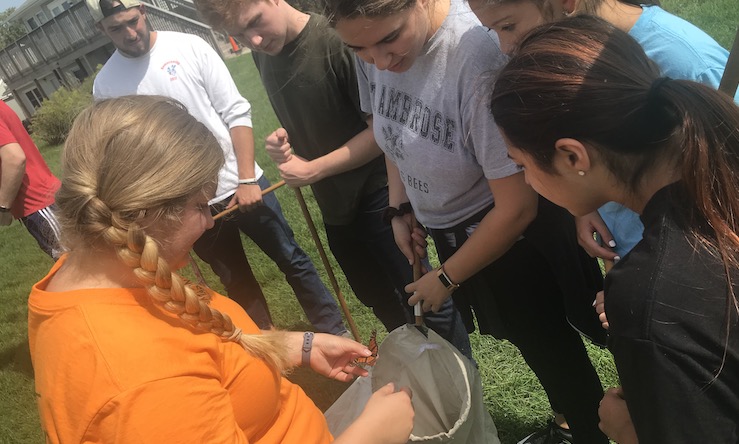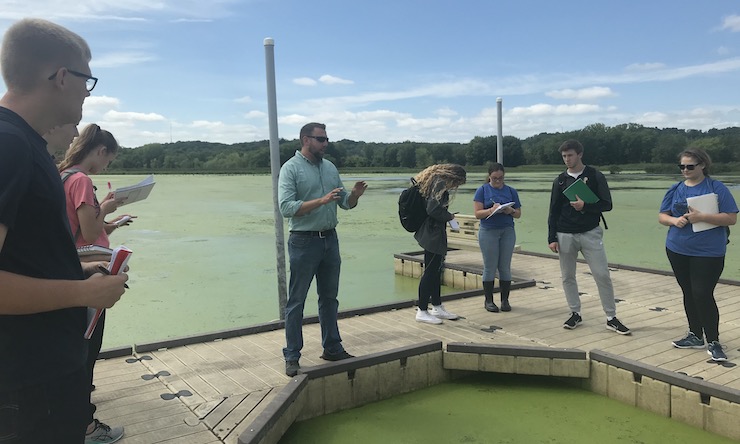Biology
Pursue a path of hands-on exploration, develop an inquisitive mind, and impact the living world around you in our Biology program.
Rare undergraduate opportunities and plenty of faculty interaction are hallmarks of Biology at SAU. Scroll down to learn more.
Our graduates work as doctors, dentists, veterinarians, and biologists at places including Pioneer Hi-Bred International, MedTox Laboratories, and many others.
Ambrose Advantages
- Student-Designed Experiments
- First-year Research Opportunities
- Study Anatomy and Physiology with Human Cadavers
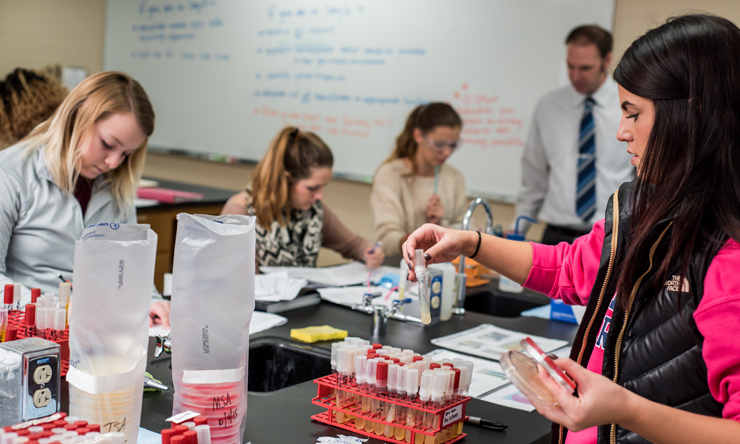
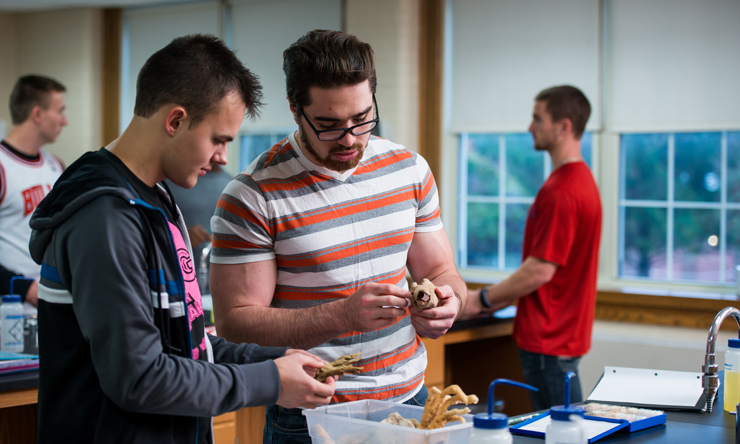
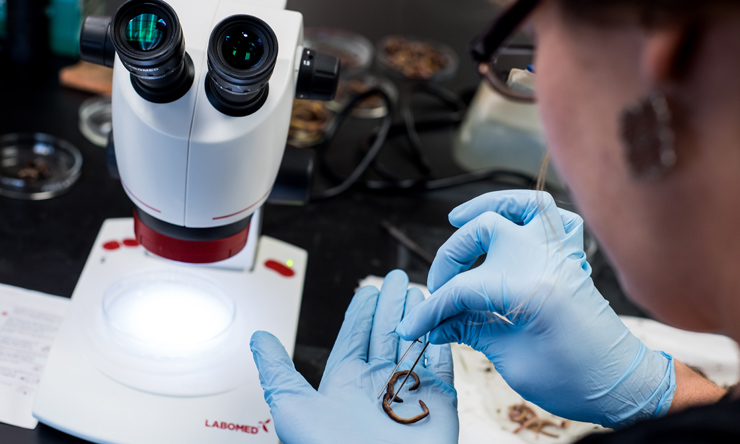
Undergraduate Biology at St. Ambrose is rigorous. But the encouragement and mentoring you'll receive from faculty will teach you how to learn and think like a scientist.
Read our Biology program sheet (PDF)
Research and Discover
Field Research
At a mid-size school like SAU, Biology majors conduct experiments and research in field locations surrounding the Quad Cities, including Nahant Marsh (featured).
More Information on the Biology Program
The Biology Department at SAU provides a strong foundation in the life sciences, which can prepare you for a variety of healthcare careers.
As a Biology major, you develop critical thinking skills, read and interpret primary scientific literature, design experiments and analyze data to answer questions about the living world. This also allows you to understand the complexities of the human body: how it works, what it needs, how it can be harmed, and how to fix those ailments using modern medicine.
Our Bachelor of Science degree in Biology, coupled with General Education courses and a Pre-Health Professions Concentration, provides you with the courses necessary for admission to many graduate programs in the health sciences.
Click here to learn more about how well SAU prepared Keegan Steele '19 for medical school.
Click here to learn more about our Pre-Professional courses of study.
Click here to learn about Doctors to Bee and the many ways our students support each other.
Or, watch Biology major Andrew Powell explain why he chose SAU for pre-med.
Biology is a broad major that can prepare you for a variety of positions and post-graduate study programs. In fact, 90% of our students go into healthcare.
Introductory courses provide a strong foundation in the major sub-disciplines of Biology. From day one, you begin training to think like a Biologist, learn how to ask interesting questions, design well-constructed experiments, analyze data, and draw appropriate conclusions.
Upper-level courses include Biological Literature and Communication, Cell and Molecular Biology, Ecology, Evolution, and Genetics. Our rigorous curriculum prepares you well for future endeavors; graduating Biology majors consistently score above the national average on the Major Field Test in Biology.
If you are pursuing a career in the health sciences, we offer both a Bachelor of Arts and a Bachelor of Science. In either degree, you get the unique opportunity to study Anatomy and Physiology with human cadavers. This rare undergraduate experience gives you an advantage in medical school, dental school, or other health science fields.
You can also take short-term study abroad courses in Marine Biology in Belize, Tropical Biology in Ecuador, or Mountain Biology in the French Alps with St. Ambrose Biology faculty. Click here to search our study abroad programs.
Our department faculty cares about your academic success and personal goals, and because we have roughly 150 biology majors, we can and do give our students personal attention and guidance.
We created a Pre-Health Professions Concentration that provides you with the necessary coursework, skills, and knowledge to enter a number of highly sought-after research and professional medical programs. In fact, our anatomy and physiology courses use cadaver dissection-based labs, making SAU one of the few universities in Iowa to offer this type of undergraduate experience.
We've designed a strong curriculum and give you opportunities that support your goals. Just ask our graduates, 90% of whom go into healthcare. Click here to read about some of our graduates and the success they've realized in the healthcare field.
In each laboratory course within the biology major, students design and implement their own experiments. You will analyze the data and present your findings in both written lab reports and oral PowerPoint presentations. These student-led, inquiry-based laboratory experiments help you gain valuable critical thinking and communication skills that can be applied to any profession.
Are you joining SAU as a first-year student? Consider enrolling in our Field Biology Research Learning Community – Inquiry in Action – which takes the lab to Nahant Marsh, one of the few remaining urban wetlands near the Mississippi River. The Integrated Statistics and New Student Seminar courses give you the support you need for generating strong experiments and presentations, and you get to present your research to the Ambrosian community at the end of the semester.
Deepen your learning by joining Biology Club or our Biology Honor Society, Beta Beta Beta. You can work closely with faculty while participating in Biology Lab Prep Works. Become a member of Doctors to Bee, and be guided and supported by your peers as you prepare for graduate school. Read the story "Students Supporting Doctors to Bee."
Join GreenLife, SAU's student environmental club focused on educating and spreading awareness about local, national and worldwide environmental concerns. The work our students do is recognized and making a difference. In fact, two of our members were named "Future Leaders of Conservation in the Quad Cities" by the Nahant Marsh Education Center.
Join the Sustainability Committee. Our mission and shared values of academic excellence, the liberal arts, social justice, and community service require Ambrosians do more than simply advocate for sustainability; we must also challenge ourselves to do more - on campus, in the world, and for our future.
We are one of few universities in Iowa offering Peace Corps Prep, a program that can make you a stronger candidate for volunteer positions within the Peace Corps or other service programs. Most students can earn the certificate – awarded by the Peace Corps – without taking extra courses.
There are many career and graduate school opportunities for Biology graduates, including:
- research and development positions;
- healthcare jobs in human or veterinary medicine, physician assistant, physical therapy, dentistry, pharmacy, allied health, and more;
- research and teaching/outreach with colleges and universities, state and federal government, zoos and aquariums, museums, conservation agencies, and more;
- non-research education at schools, museums, zoos, national and state parks;
- communication and marketing employment in publishing, pharmaceuticals, manufacturing, software, government, non-profit organizations;
- legislation-related careers in law, government, or advocacy organizations.
- Keegan Steele '19 starts medical school in the fall at Indiana University, which also accepted him into its Rural Medicine Program. Learn more about his Ambrosian experience.
- Gabriel Price '16 is currently earning his doctorate (Ph.D.) from the University of Illinois at Urbana-Champaign in Ecology, Evolution, and Conservation Biology. He is studying the effects of invasive earthworms on soil microbes and plant communities in the Midwest. Read about the award-winning company he launched and the impact he's making on the world.
- Meghan Ward '10, who graduated from the University of Illinois College of Veterinary Medicine in 2014, is currently employed as a DVM at Countryside Veterinary Service. She supplemented her biology major with a minor in chemistry.
- Laura Sass '09, who graduated from The University of Iowa College of Dentistry in 2015, is currently employed as a DDS at Community Health Care, Inc. in Iowa. She also minored in chemistry.
Dennis Tarasi, PhD, Chair and Assoc. Professor
Neil Aschliman, PhD, Professor
Amy Blair, PhD, Professor
Amanda Bohnert, MA, MS, Lecturer
Matt Halfhill, PhD, Professor
Kirk Kelley, PhD, Professor
Brenda Peters, PhD, Professor
Justin Rice, PhD, Asst. Professor
Nathan Steffens, Asst. Professor
Diamond Jelani, Biology Laboratory Coordinator
Degree Requirements
Read course descriptions in the online course catalog
Required:
†BIOL 199 General Biology I: Foundation of Living Systems
BIOL 200 General Biology II: Functioning of Living Systems
BIOL 201 Diversity of Living Systems -or- BIOL 251 Fundamentals of Microbiology
BIOL 300 Biological Literature and Research
BIOL 301 Cell and Microbiology
BIOL 303 Genetics
BIOL 307 Ecology
BIOL 348 Evolution
†CHEM 105 General Chemistry I (1-4 credits)
CHEM 106 General Chemistry II (1-4 credits)
CHEM 207 Organic Chemistry I
CHEM 209 Organic Chemistry Lab
†MATH 171 Elementary Functions
†STAT 213 Applied Statistical Reasoning for the Sciences
Major Field Test, 0 credits
Choose one:
†PHIL 207 Ethics
†PHIL 310 Bio-Medical Ethics
†PHIL 311 Environmental Ethics
†THEO 110 Introduction to Moral Issues
or another course approved by the department.
Optional Concentrations: Pre-Health and Secondary Education
Courses below are taken in addition to the major requirements, unless indicated otherwise.
Pre-Health Professions:
Required:
†MATH 191 Calculus and Analytic Geometry I
Select eight credits from:
BIOL 230, 232, 211/251 or an approved course;
Choose one:
EXPL 201, Experiential Learning with transcript notation, 0 credits
EXPL 202 Experiential Learning, 1 credit
BIOL 401 and BIOL 402
Choose either:
Both CHEM 208 and 210, OR CHEM 319;
Choose either:
Both PHYS 203 and PHYS 204, OR both PHYS 251 and PHYS 253.
Secondary Education:
Required:
Acceptance into the Educator Preparation Program
CHEM 110 Laboratory Safety
Please consult your advisor for additional requirements.
† satisfies a general education requirement
By following this outline, you have a plan to graduate with a Bachelor of Science degree in Biology within four years – plus room to tackle another interest.
This plan assumes the student has not taken three years of foreign language in high school.
Bachelor of Science in Biology
Some courses have prerequisites. Consult the online course catalog for more details.
Year One
| Fall | Credits | Spring | Credits |
|---|---|---|---|
| BIOL 199/L General Biology I Foundations of Living Systems | 4 | BIOL 200/Lab General Biology II - Functioning of Living Systems | 4 |
| ENGL 101 English Composition | 3 | Oral Communication (COMM 129, 132, 203, 228 or 329) | 3 |
| MATH 171 Elementary Functions | 3 | THEO 100-200 level | 3 |
| NSS 101 New Student Seminar | 1 | IL 101 Information Literacy | 1 |
| KIN 149 Wellness Concepts | 1 | KIN Activity | 1 |
| Foreign Language 101 | 3 | Foreign Language 102 | 3 |
| 15 | 15 |
Year Two
| FALL | Credits | SPRING | Credits |
|---|---|---|---|
| BIOL 201/L Diversity of Living Systems | 4 | BIOL 251/L Fundamentals of Microbiology | 4 |
| CHEM 105/L General Chemistry I | 4 | CHEM 106/L General Chemistry II | 4 |
| STAT 213 Applied Statistics | 3 | Electives | 6 |
| Social science | 3 | PHIL/THEO 100-200 level | 3 |
| Elective | 3 | ||
| 17 | 17 |
Year Three
| FALL | Credits | SPRING | Credits |
|---|---|---|---|
| WI-BIOL 300 Biological Literature & Research | 3 | BIOL 303/L Genetics | 4 |
| CHEM 207 Organic Chemistry I | 3 | Ethics (PHIL 207, 310, 311 or THEO 110) | 3 |
| CHEM 209 Organic Chemistry Laboratory I | 1 | Humanities# | 3 |
| 300-level Philosophy/Theology | 3 | Writing Intensive course outside BIOL | 3 |
| Creative Arts | 3 | Elective | 3 |
| Elective | 3 | Kinesiology activity | 1 |
| 16 | 17 |
Year Four
| FALL | Credits | SPRING | Credits |
|---|---|---|---|
| BIOL 307/L Ecology | 4 | BIOL 348/L Evolution | 4 |
| BIOL 301/L Cell and Molecular Biology | 4 | Electives | 6 |
| 300-level electives | 6 | 300-level elective | 6 |
| Elective | 3 | Major Field Test | 0 |
| 17 | 16 |
#=Humanities courses must be from two different departments
Pre-Health Professions Concentration
Some courses have prerequisites. Consult the online course search or course catalog for more details.
Year One
| FALL | Credits | SPRING | Credits |
|---|---|---|---|
| BIOL 199+Lab | 4 | BIOL 200+Lab | 4 |
| ENGL 101 English Composition | 3 | Oral Communication (COMM 129, 132, 203, 228 or 329) | 3 |
| MATH 171 Elementary Functions | 3 | CHEM 106+Lab | 4 |
| CHEM 105+Lab | 4 | PSYC 105 or SOC 101 | 3 |
| NSS 101 New Student Seminar | 1 | IL 101 Information Literacy | 1 |
| 15 | 15 |
Year Two
| FALL | Credits | SPRING | Credits |
|---|---|---|---|
| BIOL 230+Lab Human Anatomy and Physiology I | 4 | BIOL 232+Lab Human Anatomy and Physiology II | 4 |
| CHEM 207 Organic Chemistry I | 3 | CHEM 208 Organic Chemistry II | 3 |
| STAT 213 Applied Statistics | 3 | CHEM 210 Org. Chem. Lab II | 1 |
| CHEM 209 Org. Chem. Lab I | 3 | BIOL 251+Lab Fundamentals of Microbiology | 4 |
| KIN 149 | 1 | Foreign Language 102 | 3 |
| Foreign Language 101 | 3 | ||
| 17 | 15 |
Year Three
| FALL | Credits | SPRING | Credits |
|---|---|---|---|
| CHEM 319 (Opt. CHEM 320) | 3 (1) | BIOL 199, BIOL 200 or 201, CHEM 106 | 4 |
| PHYS 203/L College Physics I | 4 | PHYS 204+Lab College Physics II | 4 |
| BIOL 300 Biological Literature & Research | 3 | Creative Arts | 3 |
| Humanities# | 3 | Ethics | 3 |
| PHIL/THEO | 3 | Social Science | 3 |
| Total | 17 | Total | 17 |
Year Four
| FALL | Credits | SPRING | Credits |
|---|---|---|---|
| BIOL 307+Lab Ecology | 4 | BIOL 301+Lab Cell and Molecular Biology | 4 |
| Writing Intensive course | 3 | BIOL 348+Lab Evolution | 4 |
| 300-level elective | 3 | 300-level elective | 3 |
| Humanities# | 3 | PHIL/THEO 300-level | 3 |
| Theology | 3 | KIN fitness | 1 |
| Total | 16 | Total | 15 |
#Humanities courses must be from two different departments.
*The Concentration in Pre-Health Professions requires students to complete either CHEM 208/210 or CHEM 319. Students preparing for careers in medicine are advised to take both courses, which also fulfills the requirements for a Non-Teaching Minor in Chemistry.
Requirements:
One course from each of the following categories:
- an introductory course: BIOL 101 or 199;
- an environmental biology course: BIOL 109 or 321;
- and a human biology course: BIOL 106, 112, 115, 205 or 230.
with additional coursework to obtain a minimum of 15 credits in Biology.
The Bachelor of Arts degree prepares science-minded students for a career in health and human services such as Physician Assistant Studies, Occupational Therapy, Speech-Language Pathology, Public Health, or an accelerated post-baccalaureate nursing program.
With your BA in Biology, you develop a greater understanding of your patients as individuals who deserve clearly communicated, scientifically accurate, and empathic healthcare.
View biology courses and descriptions in the online course catalog
Required:
All courses are 3 credits unless otherwise notated.
†BIOL 199 General Biology I: Foundation of Living Systems
BIOL 200 General Biology II: Functioning of Living Systems
BIOL 230 Human Anatomy and Physiology I + Lab (4 credits)
BIOL 232 Human Anatomy and Physiology II + Lab (4 credits)
BIOL 251 Fundamentals of Microbiology + Lab (4 credits)
WI-BIOL 300 Biological Literature and Research
BIOL 301 Cell and Microbiology OR BIOL 303 Genetics
BIOL 307 Ecology OR BIOL 348 Evolution
BIOL 350 Scientific Communication (2 credits)
†CHEM 105 General Chemistry I (1-4 credits)
CHEM 106 General Chemistry II (1-4 credits)
†MATH 171 Elementary Functions
†STAT 213 Applied Statistical Reasoning for the Sciences
†PHIL 207 Ethics
†PHIL 310 Bio-Medical Ethics
†PSYC 105 Introduction to Psychology
Major Field Test, 0 credits
One 200-level PSYC
One 300-level PSYC
†COMM 203 Interpersonal Communication
One 300-level COMM
Choose: [EXPL 201 or 202] or [BIOL 401 and BIOL 402] or HON 401
† satisfies a general education requirement
By following this outline, you have a plan to graduate with a Bachelor of Arts degree in Biology within four years – plus room to tackle another interest.
This plan assumes the student has not taken three years of foreign language in high school.
BA in Biology
Some courses have prerequisites. Consult the online course catalog for more details.
Year One
| Fall | Credits | Spring | Credits |
|---|---|---|---|
| BIOL 199/L General Biology I Foundations of Living Systems | 4 | BIOL 200/Lab General Biology II - Functioning of Living Systems | 4 |
| THEO 100-level | 3 | STAT 213 Applied Statistics | 3 |
| MATH 171 Elementary Functions | 3 | THEO/PHIL | 3 |
| Humanities# Historical and Cultural | 3 | PSYC 105 Intro to Psychology | 3 |
| COMM 203 Interpersonal Communication | 3 | ENGL 101 English Composition | 3 |
| New Student Seminar | 1 | ||
| 17 | 16 |
Year Two
| FALL | Credits | SPRING | Credits |
|---|---|---|---|
| BIOL 230/L Human Anatomy and Physiology I | 4 | BIOL 232/L Human Anatomy and Physiology II | 4 |
| CHEM 105/L General Chemistry I | 4 | PSYC 300-level | 3 |
| Foreign Language I | 3 | EXPL 201 Job Shadow/Internship | 0-2 |
| PSYC 200-level | 3 | Foreign Language II | 3 |
| KIN Activity | 1 | KIN 149 Wellness Concepts | 1 |
| IL 101 Information Literacy | 1 | CHEM 106/L General Chemistry II | 4 |
| 16 | 15-17 |
Year Three
| FALL | Credits | SPRING | Credits |
|---|---|---|---|
| WI-BIOL 300 Biological Literature & Research | 3 | BIOL 251/L Fundamentals of Microbiology | 4 |
| BIOL 300-level | 4 | Humanities# Literature and Film | 3 |
| PHIL 207 Ethics | 3 | Elective | 3 |
| Elective | 3 | COMM 300-level | 3 |
| Creative Arts | 3 | PHIL 310 Biomedical Ethics | 3 |
| 16 | 16 |
Year Four
| FALL | Credits | SPRING | Credits |
|---|---|---|---|
| 300-level Elective | 3 | BIOL 300-level | 4 |
| BIOL 350 Scientific Communication | 2 | 300-level Electives | 6 |
| Electives | 6 | Elective | 3 |
| Writing Intensive outside BIOL | 3 | Major Field Test | 0 |
| 14 | 13 |
#=Humanities courses must be from two different departments
Scholarships and Grants
St. Ambrose offers excellent scholarships and grants, work-study and other financial aid options! Full-time students may be eligible based on your strong academic performance in college, your talent in fine arts or athletics or your demonstrated financial need as determined by the Free Application for Federal Student Aid (FAFSA). The SAU school code for the FAFSA is 001889.
ON CAMPUS
Merit-Based Scholarships
4.0 GPA: $24,000
3.75-3.99 GPA: $22,000
3.0-3.749 GPA: $20,000
2.5-2.99 GPA: $18,000
2.0-2.49 GPA: $14,000
If GPA is 2.0-2.49, additional documents and review required for admission.
OFF CAMPUS
Merit-Based Scholarships
4.o GPA: $17,000
3.75-3.99 GPA: $16,000
3.0-3.749 GPA: $15,000
2.5-2.99 GPA: $14,000
2.0-2.49 GPA: $13,000
If GPA is 2.0-2.49, additional documents and review required for admission.
ADDITIONAL INSTITUTIONAL AID
Ambrose Advantage Full-Tuition Scholarship
Pell-eligible Iowa residents, learn more here
Fr. Welch Alumni Scholarship: $500 per year
Parent is a St. Ambrose graduate
Catholic Traditions Scholarship: $1,000 per year
Students with Catholic religious denomination or plans to graduate from Catholic high school
Minority Scholarship: $500 per year
Ethnically diverse student
Athletic Scholarships: varies
Performance and ability
Fine Arts Scholarships: varies
Performance and ability in music, art and theatre
Faith Learning Justice Campus Ministry Scholarships: $2,000 per year
Recognition of involvement in church and community service and interest in strengthening faith and growing as a leader in campus ministry
Scholarships are determined by unweighted GPA, and are renewable for four years of undergraduate student. Increases in scholarship awards due to change in GPA will be reviewed until March 1.
Grants are money that you don't repay, and they can come from government or private sources. SAU receives all financial aid funds directly - including loans and grants - then applies them to your account: once in the fall term and once in the spring term. Grants can be used to cover your tuition, books, and housing costs. You must apply for grants each academic year. If you have any loan funds in excess of your costs, you may receive a refund. If you are a first-time borrower, there is a 30-day hold on your first disbursement. For all of these grants, you must complete the Free Application Free Application for Federal Student Aid (FAFSA) as soon as it is available.
Iowa Tuition Grant
To be eligible for the Iowa Tuition Grant, you must be a resident of Iowa as defined by the State Board of Regents and currently enrolled or planning to enroll in an undergraduate degree program at an eligible Iowa college or university (SAU is eligible). Iowa College Aid administers need-based college financial aid for Iowans, such as the Iowa Tuition Grant.
Award: $7,500 maximum
Federal Pell Grant
Awarded to students of the highest need based on how much your family can contribute to your education. The U.S. Department of Education sets a threshold. Then, when you file your Free Application for Federal Student Aid (FAFSA), it computes where you land within that threshold and determines if you qualify for the grant and for how much.
Award: $6,895 maximum
Federal Supplemental Education Opportunity Grant (FSEOG)
You must file a FAFSA to qualify for a Pell Grant. This grant is awarded on a first-come, first-served basis to students who have submitted all required documents for review and in time for the review to be complete. If you are eligible for a Pell Grant or SEOG, the awards will appear on your financial aid award letter.
Award: $400 maximum
Federal Work Study
Must secure campus employment.
Award: $2,560
Federal Teacher Education Assistance for College and Higher Education (TEACH) Grant
Provides aid to students intending to teach in a high-need field at a school that serves low-income families (as determined by the U.S. Department of Education or a state education agency). Review criteria and all details here.
Award: up to $4,000
There are many opportunities to receive scholarships from outside sources, here are a few websites to begin researching your options:
- Fastweb
- College Board Scholarship Search
- Scholarships.com
- Peterson's Award Database
- Scholly (app download)
Another tip: Next time you're on campus, check out the bulletin board outside Student Financial Services where we post more flyers and applications for outside scholarships.
Gabe Price '16
Two years after graduating from SAU, Gabe had launched an award-winning start-up, applied for a patent, wrote a USDA grant, and was innovating new ways to reduce waste, boost soil quality and crop yields. His interest in earthworms, soil microbes and plants was sparked by an SAU professor, which led him to participate in undergraduate research.
Read Gabe's story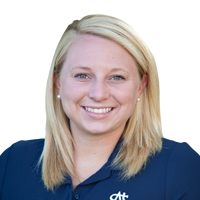
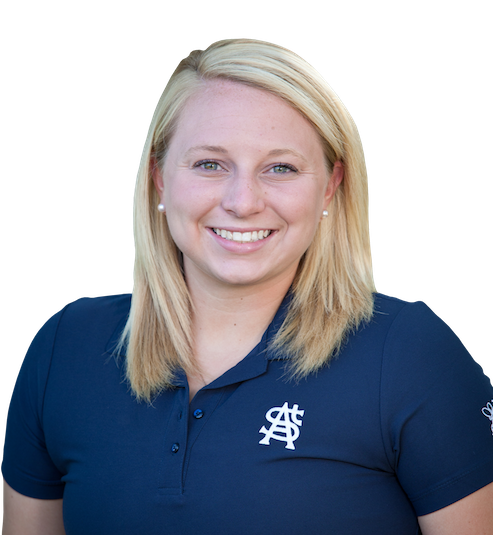
Ashley Nelson
Bachelor of Science in Biology,Class of 2014
We have roughly 150 biology majors, which means our faculty can give students personal attention and guidance. Many of our undergraduate programs are intentionally designed to give you an exceptional foundation for medical programs. We do all we can to help you explore – and reach your goals – just as we did with Ashley.
Contact
Dennis Tarasi, PhD, Chairperson
Biology Department
Lewis Hall, 2nd floor
518 W. Locust St.
Davenport, IA 52803
563-333-6134
TarasiDennisD@sau.edu

